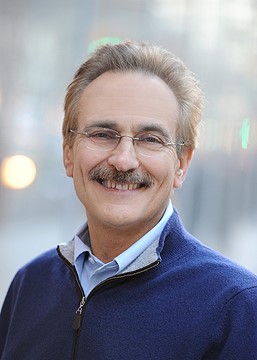How to Win the Ratings – The Breakfast Show Blueprint – Part 9

Greg Smith is a Director of Radio Today.
In this series of articles I wanted to explore the key ingredients of a top rating breakfast show.
I’ve enlisted the help of prominent programmers & researchers, people much smarter than me, to tell you how to win the ratings in radio’s most important daypart.
You can read part 1 with Jon Coleman, part 2 with Todd Wallace, part 3 with Randy Lane, part 4 with Brad March, part 5 with Rad Messick, part 6 with Dave Charles, part 7 with Mark Ramsey and part 8 with Tracy Johnson.
Today we learn about what makes up the best radio shows from John Parikhal (left), a media consultant and author who has enviable radio and TV experience.
John Parikhal has consulted to and researched for over 1000 companies – including media, entertainment, packaged goods, and internet/online companies – in the US, Canada, Europe, Australia and South America.
He has written over 300 articles on marketing, media, consumer behaviour and how to 'cut through the clutter' along with a book, 'The Baby Boom: Making Sense of Our Generation at 40'. Most recently, he wrote the Branding chapter for Valerie Geller's wonderful book 'Beyond Powerful Radio'.
Along the way, he co-created a hit late night TV show for NBC, authored a couple of books, and wrote a radio show that ran for 5 years on NBC and around the world.
His focus is on helping businesses and people grow, by understanding human behaviour better and applying this knowledge in the appropriate way.
In 2013, he formally partnered with Philippe Denichaud to form Breakthrough Management to help companies and people survive, transform and grow by using proven business tools that help them 'fix it right the first time'. Their blog is at www.btmgmt.net
He is also a partner with Taran Swan in Media Fix, which focuses on using deep consumer insights about digital behaviour to generate highly effective online results. Their blog's at www.gomediafix.com.
—————
After thinking about it and looking at the greatest shows in the morning, here’s what I think makes the best…
Number 1 is STORIES. The way they are told, the subject matter, the humour, and the characters. It permeates all the best shows. If you don’t tell stories, people don’t REMEMBER anything about the show – which makes them less likely to tune in the next day.
The best show reflects the listeners’ morning experiences through ‘empathetic’ comments, relevant stories and music that helps generate energy.
For different audiences, these mean different things.
For example, when Howard Stern is “empathetic”, it’s with his male listeners – about how they don’t get enough sex, how they fantasize about their “wild” side, want to hear the very personal side of their favourite “stars”, etc.
For Elvis Duran, it’s with his 18-44 year old females. It’s about gossip, giving friends advice (that they don’t want), awkward social situations, etc.
For a News show, it’s about up-to-date, very topical, slightly contexted “stories” to start the day.
In all 3 cases, it’s the STORIES that make it great. The way the narrative is spun, developed, and paid off. The better it’s done, the more memorable. And music (as ‘bumpers’ or as songs) is an essential part.
A great show also reflects and relates to the listeners ‘anticipation’ of the day ahead as well as their ‘waking up’ experience.
It incorporates features and stories that you’ll be able to talk about or remember later in the day – to tell a friend or just chuckle to yourself.
The best have ‘fixed time’ features that encourage tune-in and recall. Traffic and Weather on the 8s. The morning prank phone call. The lost Beatle song. There are so many ways to do this.
The host(s) will have proven ability to make listeners laugh and brighten their morning, and will engage the audience through stories.
If the show plays a lot of music, the criteria are the same.
The best shows usually have a Trio at the centre – we used to call them a Dick, Dork, and Dear. One is the ‘straight man’ – he (or she) really controls the show’s flow and can often be funny or witty.
The “Dork” is the ordinary one. He’s the butt of the jokes but never really backs down, glad to be on the team and filling an important role as either Generator or Reactor.
The “Dear” keeps everyone on an even keel, provides the female point of view (although some Dears are men in bigger teams), and provides great comic relief at the expense of the other two.
A note about Generators and Reactors – Valerie Geller brilliantly identified this point (it’s covered in the latest version of her book).
One (or more) people are Generating. The others are Reacting to them. It’s the dynamic that always works. If you don’t have it, the show goes flat.
John Parikhal
Email: [email protected]



